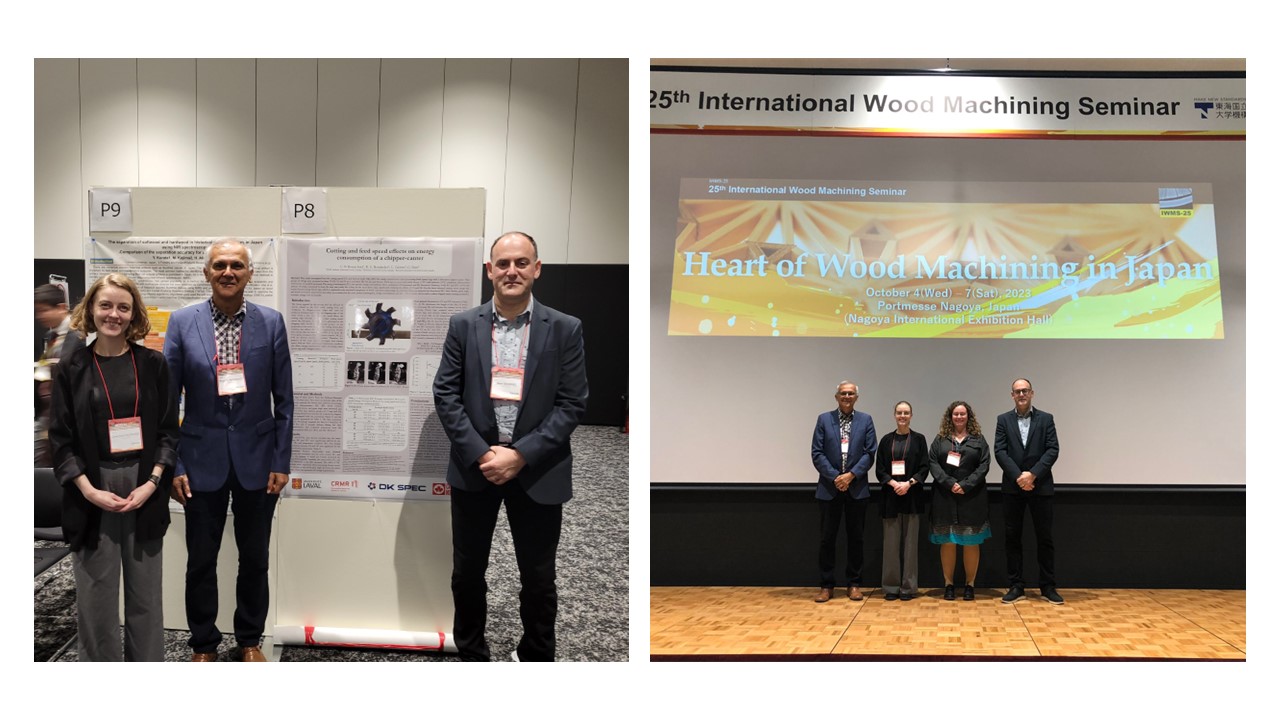Cleide Bourscheid, Rémi Georges, and Roger Hernandez participate in the 25th International Wood Machining Seminar (IWMS-25)!
Professors Rémi Georges et Roger Hernandez, and student Cleide Bourscheid took part in the «25th International Wood Machining Seminar (IWMS-25)» held in Japan from October 4 to 7, 2023, to present their research results.
It was an excellent opportunity to share their experiences, acquire new skills, and expand their network of contacts by exchanging with specialists from different cultural and professional backgrounds. Congratulations and best wishes for success!
Thank you to the CRMR student mobility program, which supported Cleide Bourscheid’s participation in this international event!

Rémi Georges participated on behalf of the team in the research project entitled «Improving the performance of guided circular saws». The project has been carried out, since 2018, in collaboration between the Department of Mining, Metallurgy and Materials Engineering, the Department of Wood and Forest Sciences, and FPInnovations, as well as several industrial partners, and aims to improve the performance of circular saws used in the sawmilling industry. It is divided into 6 sub-projects aimed at increasing saw life, reliability, material yield, product quality, and sawmill productivity. The project was funded by the Quebec government as part of the SM2 initiative, as well as by NSERC. Following on from the good results obtained during the techno-economic study phase, the project now aims to finalize the development of a new-generation, high-performance circular saw. Professor Roger Hernandez is part of this research project.
Cleide Bourscheid contributed a scientific paper and poster on her Ph.D. project entitled «Impacts of cutting and feed speed on the performance of a squaring and fragmentation machine». She is working under the supervision of Professors Roger Hernandez and Carl Blais. The aim of her project is to examine the effects of cutting speed (CS), knife feed rate (FK), and wood temperature on energy consumption during the processing of black spruce logs by a canter-fragmenter. Nine groups of fifteen logs were fragmented under three CS (20, 25, and 30 m/s) and three FK (19, 25, and 32 mm). Each bead was fragmented at two temperature conditions: frozen (-13°C) and unfrozen (19°C). Average power increased with increasing CS and FK. This behavior can be explained by the direct relationship between power and rotation, cutting and feed speeds, as well as by the increased volume of wood cut. Energy consumption and specific cutting energy increased with increasing CS and decreasing FK.
For all three parameters evaluated, cutting energy consumption was higher for frozen wood, which would be due to the increased mechanical strength of the wood. A positive relationship was obtained between the co-variables sapwood moisture content, heartwood moisture content, density, grain angle, and volume of wood processed into chips in relation to the three electrical evaluation criteria. These results provide useful information for adjusting the cutting parameters of squaring and framing machines in order to maximize the electrical management of sawmills.

